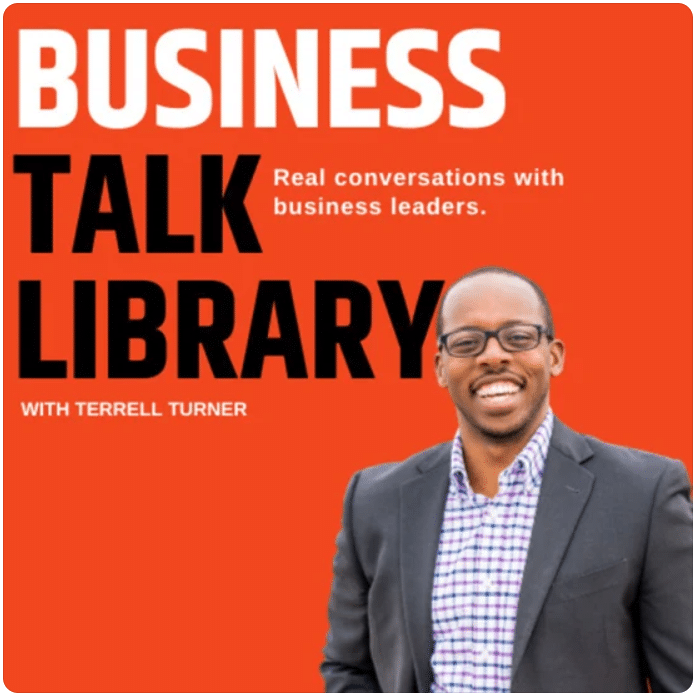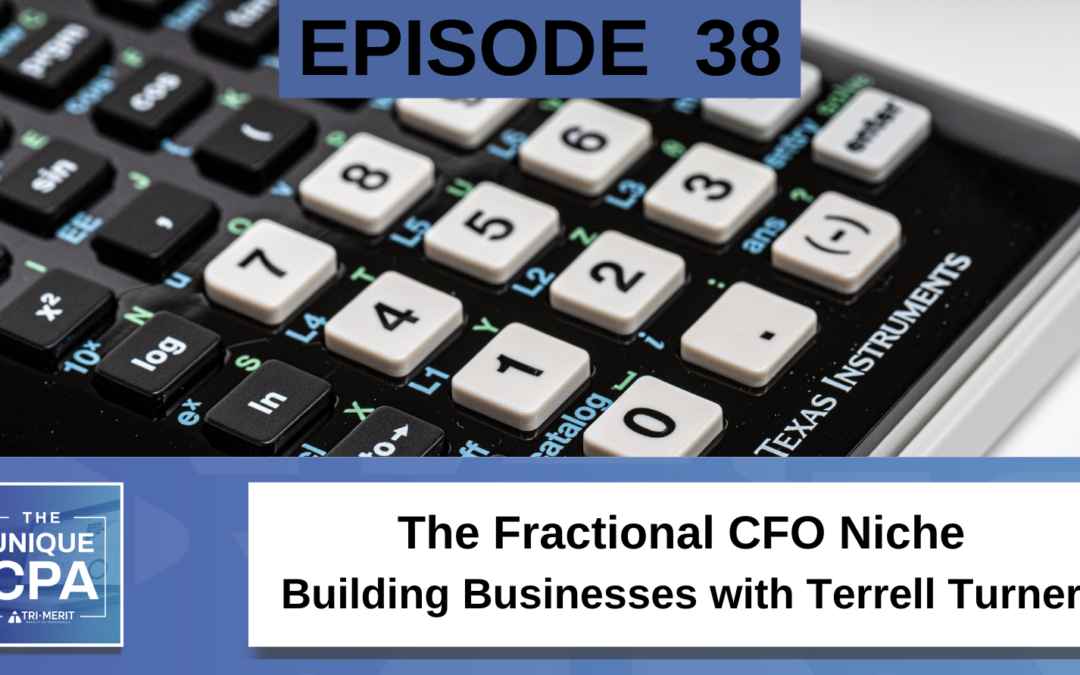Boosting Businesses with Terrell Turner
Fractional CFOs are a relatively new, fast-growing, and unique segment of the financial space. Randy talks to Terrell Turner of TLTurner Group, a fractional CFO firm that offers a wide array of services to business owners in various industries. Terrell is also the host of The Business Talk Library podcast, a series of over 200 shows and resources for business owners, entrepreneurs and professionals.
Today, our guest is Terrell Turner. Terrell is a CPA, he’s co-founder of TLTurner Group, a fractional CFO firm. He is also the host of the podcast, The Business Talk Library, which I was very honored to record an episode on that recently. And we’re going to talk today about his services, what a fractional CFO is, and anything else he can educate me on. So Terrell, welcome to The Unique CPA.
Hey, thank you for having me.
Yeah, it’s great. It was great talking to you last week on your show, and I really appreciate that. You actually have multiple podcasts, don’t you, other than The Business Talk Library? Didn’t I see there’s other things out there your recording?
Yeah. So we have a couple of shows. I mean, we started off just just creating like five minute—two to five minute videos. And then it kind of expanded like, “Hey, let’s have a show where we interview other business owners, business leaders.” I think because we were just hearing so many people talk about I call it “the social media version of being an entrepreneur,” which I’m like, that doesn’t match reality. So let’s talk to real people and hear what the real story is.
And people started asking us about like, “Hey, can you talk a little bit more finance and accounting?” So my wife and I started a second show called The Finance and Accounting Show.
Nice.
And then also, my wife is fluent in four languages. So she does a show in Spanish for the Spanish-speaking audience. And then one of my friends that I went to graduate school with, he wanted to focus on careers and like the accounting / the finance space, so he does a show on careers. And we kind of helped with some of the background stuff on the editing and all that under the Business Talk Library umbrella.
Wow. So you’re like a podcast conglomerate, you’re out there! You’re gonna take over the podcasting world, it sounds like. At least from the financial side of things. So that’s pretty cool.
You are a grizzled veteran compared to me what you’ve I know on The Business Talk Library, you have well over 200 shows now, right?
Yeah, yeah. So we’re, I think we’re at like 260+, I think right now.

Terrell hosts The Business Talk Library podcast.
Alright, so I’m gonna learn a few things from you today, then. I think we’re at about 40. I actually should know that. I think this is about the 40th episode. So, 40% of our way to 100. So we’re getting there, but nowhere near your 200+ yet.
[bctt tweet=”A fractional CFO is going to look at the strategic, and kind of a mix of the operational side of the business.” username=”TriMerit”]
Alright, well, let’s get into talking about what you do. So fractional CFO: obviously, kind of get the idea of what it is by the name, but can you give us a little definition of what a fractional CFO does?
Yeah, what’s that mean? A fractional CFO is gonna look at kind of the strategic and kind of a mix of the operational side of the business. So as you’re thinking about, “Hey, we’re thinking about introducing this new product.” Okay, “What price do we need to put on it? You know, what does it do to our cost structure? You know, what’s the expected cash flow?” Or like, “Hey, we’re gonna do something bigger, where we’re going to actually buy another business. Well, you know, what’s the right valuation we should aim for? How much cash do we need to infuse in the business?” Or, “Hey, we need to do a price change, what does that mean?” And really going through looking at kind of the operational side.
And then the strategy and kind of bringing it together, and then also having conversations with the CPA, or if some companies that have a bookkeeper, having a conversation with them, and making sense and tying it all together, so that the people who are operating the business can make informed financial decisions.
Alright, so a lot of what you just said there is more like, based on transactional deals, we’re going to do this. So now we need to help set that up, I’m assuming on an ongoing basis, you’re helping them out to understand financial statements and understand, you know, potential pitfalls of taxes, you know, if they’re running some business online, and they don’t think about sales tax in, you know, different jurisdictions as that types of advisory services you’re working on as well?
Yeah. So we do bring that into play, because a lot of the people that that we’re working with, I mean, they’re passionate about their craft. They don’t even know what to be aware of on the financial, the accounting, tax side. Being a CPA, it’s like, I understand that. So I can at least bring it to their attention, like, “Hey, here are some things we need to consider on the sales tax side or the taxation side,” or, “Hey, here are things like, here’s how the accounting works for that type of transaction. This is how we need to think about those types of things.”
Okay, so in general, is your engagement with the client usually open ended or is it okay, we’re working on this specific project for this length of time? What’s a normal engagement you see then on that?
Yeah, so we have some that we have recurring, like, for example, restaurants where we work together, we have weekly calls where we’re going through, “Okay, what did the numbers look like for last week? What are the margins looking like,” as we’re talking through that. And as they’re thinking about, you know, their future plans, like “What do we need to change?” so I’m working with them on operational level. And then there are some clients where they really need me for a transaction. So those I would say we do more project based work on the transactions.
But like I said, some clients we are working in, in the day-to-day, and one of the things that we did realize that a lot of clients, what they were having is they had a bookkeeper, but the bookkeeper wasn’t helping them understand what the numbers actually meant. So one of the programs we launched was a program called Bookkeeper Plus, where we partner with a couple of bookkeeping firms where we take over the bookkeeping—so our partners do the bookkeeping—and then we’re working having whether it’s weekly, bi-weekly, or monthly meetings with the clients to go through the numbers saying, “Hey, this is what the numbers mean, these are some of the decisions we need to think about based on the data that we’re seeing.”
Okay, I think that’s an awesome service you provide. So anytime anybody starts a business, or is running a business that exists, I mean, they’re running a business, that their passion most likely isn’t tax and accounting, you know? Their passion is whatever that business is they started, whether it’s selling bicycles, or a restaurant or, you know, whatever it is. It’s usually based on a passion or a knowledge are a talent that they have.
But that tax and accounting side is one of the most important sides of the business and not being on top of that would obviously potentially hurt everything you’re doing. So I think having you available to go out and consult on those things is invaluable. And I think every business owner should be looking at that. You know, some of them are at a point where they have a CFO internally, but even though services can still use an outside person. So I think the service you bring in is great.
I guess to back up a little bit, then talking about your services. How did this start? Where did you get this idea? And why did you do it?
Yeah, I mean, so I spent most of my career working for Fortune 500 companies like Navistar, which makes you know, school buses, heavy duty vehicles. And then I moved over to General Electric. And at General Electric, I was in the aviation division, and I worked at a lot of like their smaller business units. And part of my job was working with the supply chain team or working with the sales team, and helping them understand the financial implications of the decisions that they were thinking about making, so that they could make better decisions. And I realized, like, finance and accounting is something that I enjoy, but there are a ton of people who are out making day-to-day or week-to-week business decisions that don’t understand the financial implications. And as I began working with them, and helping them understand it, what I started noticing is the results of the business started to improve.
[bctt tweet=”The tax and accounting side is one of the most important sides of the business, and not being on top of that would obviously potentially hurt everything you’re doing.” username=”TriMerit”]
And so after I left General Electric, I took a director of F&A role with a startup. And in the startup world, everybody’s kind of running a million miles an hour in so many different directions, and people are making decisions that were kind of working against each other financially. So I worked a lot with them to help them understand like, “Hey, here’s what the financial picture of those decisions look like.” And people started to it was almost like the light bulb went off. They’re like, “Oh, that’s probably—I shouldn’t do that,” or, “Hey, that’s actually hurting the business.”
And I think as I started doing that more, I’m like, “Man, there are probably a ton of business owners out there that are having the same issues; they just don’t realize it.” So I was like, “I can take my knowledge of accounting, finance and tax, and I can offer it as a service to help business owners,” and I’ve been seeing the light bulbs go off for them, because they’re like, “Oh, that makes more sense now,” and they’re able to make better decisions.
That has to be pretty rewarding that to get in and help a client and help them turn that corner of understanding those financials. So that’s pretty cool.
When you started then I want to kind of get into how you were getting business and I’m assuming the CPA firm is a referral source that you have currently. Is that? And is there other ways that clients come to you?
Yeah, the start of it was, there were a couple people that again, they would reach out to me where we originally started just creating videos explaining. Like people would ask me questions, and I was working a full time job at the time. And I was like, I don’t have time to take everybody’s call. So when people would ask me a question, I would just create a video and answer their question and say, “Hey, you know, here you can go check out the question or the video.”
Like I had a friend that was optometrists who would have questions so I would just create the video, tell him to go check it out, and in doing that, it really started helping me to start understanding what are the types of challenges people are having. And so I just continued creating videos, and then when I decided to leave my career full time to start it on my business, one of the pieces of advice I got is, you know, “Talk to people who are already doing it.”
So I actually I was located in Charlotte, North Carolina, so for about three months, I would hop on the phone with other fractional CFOs, with other CPAs in my city. I think I ended up talking to like over 60 people in a matter of four months of just letting them know who I was, what type of work I did, and it really started kind of this network of referrals. So some CPAs will refer—even some other fractional CFOs that were over their capacity, they would refer people, and then that’s why I got into doing The Business Talk Library of just having other entrepreneurs and business owners and business leaders on to talk about their business, talk about their story, and that allowed me to develop relationships with them, and that led to referrals as well.
And when you start getting these referrals, did that create any niche businesses? Are you pretty much helping every industry that needs some help?
Yeah, it definitely has created a niche, I think over the past month, you know, I started to focus on the niche, and I think that’s always been kind of a—early on, I heard, “Hey, you know, you want to focus on your niche.” And I was like, “Okay, this is gonna be my niche,” and there wasn’t client attraction there, so I’m like, “Okay, maybe that’s not my niche!”

As a fractional CFO, Terrell has settled into a business niche of servicing restaurants.
I mean, it was a little bit of trial and error. And then I think maybe about three weeks ago, I was looking at, like, kind of, our clients and I was like, “We have like twelve different restaurants, maybe that’s our niche.” And then there are some other clients that are in the food industry where they make consumer-packaged goods that they sell in supermarkets and stores regionally and nationally. So I’m just like, “You know what, maybe that is our niche!” And so I would say kind of the restaurant and food industry is our niche.
Yeah. Well, it sounds like it. So do you have a passion for food as well as finance and accounting?
You know, I do—and it works out great, because my wife has a passion for trying and cooking different dishes. She lived in like nine different countries before she came to the U.S. as a teenager. So trying the different dishes from different cultures and stuff like that, to where it’s like, it became a way for us to marry our experience with finance and accounting with you know, our love for food. And I think it’s very rewarding to see restaurants start to make those mental shifts, because what I find is most restaurant chefs, or those that are making a product, they know their product, but they just don’t know the business side of things. So to help them make those mental shifts is extremely rewarding.
Right. That’s nice. So that industry in general, is an industry that’s been hit pretty hard lately with the pandemic and that, so they obviously can use your help. Have you had to navigate all the legislation that’s out there now? There is actually a lot of opportunities to help restaurants with some legislation, is that something that you’re advising them on, or working with them on or digesting still?
Yeah, I’ve been diving into it a bit more, and really helping them navigate those things like, you know, when it came down to like, the PPP, and even when it comes down to just, you know, with the mandates on capacity restraints, of just going through, like building out financial models, like, “Hey, if your capacity goes down, what does that look like?” Or “If you need to transition more of your business to delivery, hey, what does that do to your business model? What makes sense? And hey, can you keep the same level of employees? And what sales numbers do you need to hit to maintain that employee base?” Helping them kind of navigate those and get access to capital to keep their business and their baby and their dream alive.
[bctt tweet=”A fractional CFO is going to understand all the aspects of the accounting and finance functions of your business.” username=”TriMerit”]
Yeah, well, that’s great—it is, you are a very important person to restaurants these days, and hopefully, the light’s at the end of the tunnel for them coming out of this with some strong business potential going forward. So that’s great. Anything else I missed on fractional CFO or anything you want to highlight that is important that we haven’t touched on?
No, I mean, I think that that that covers it. I mean, from the standpoint that a fractional CFO is going to understand all the aspects of the accounting and finance functions of your business to where, like I said, as you and I talked about, I’m not a specialist in tax. I understand it enough to know when we need to bring a specialist in, to where I tell people that a fractional CFO is going to be there to kind of help you kind of coordinate that, of letting you know, “Hey, when do we need to bring someone in that knows tax credits more than we do?” Because that’s not something that you know your average business owner is going to even think about or even know to think about.
Right. I think that’s great. I think really with the push for client advisory services, client accounting services, the CPA firms have now—having an option like you to bring in there to help them with their clients I think is invaluable and so, I wish you luck with everything. I know you have a huge passion for what you’re doing. I’ve heard in your podcast and I just hear it every time i’ve talked to you, so I appreciate that.
A couple things before we close: But one, and I didn’t warn you this so we’ll see if i put you on the spot, what you come up with here, but I usually like to ask people a fun fact about them. So is there a fun fact about Terrell Turner that we need to know? Are you an avid hiker or you collect marbles? Are you a bourbon fan? Is there anything that we need to know about you?
I would say you know I’m always in between two. So I’ll say the first one is, I would say I moved about nine times before, I guess before I hit middle school, because my dad was in the military. So it forced me to always like, be adaptable. So I’m a fan of traveling, and then of course my wife, she lived in nine different countries so I was like, you know, I’m an avid fan of just traveling, seeing new things.
The other thing that i always like bring up with people is like, a hobby of mine are like, jigsaw puzzles. I’m not sure what. Maybe it was just it gives me a recess from all the things that i normally have to think through. I mean it became a good thing because I have like a couple of nonverbal autistic nephews and they love puzzles so it just became something that we could do. I’m just like I’m an avid jigsaw puzzler. I mean I haven’t done any competitions or anything like that, but I do like to do them for fun.
Are there competitions like speed jigsaw puzzle competitions, or, or what are the competitions?
Look, I’ve heard of some, like speed jigsaw puzzle competitions—they’re rare but I was just like, “Yeah I’m not that level, I’m more of just kind of a recreational person.”
That’s cool. Yeah, we go in spurts with those—they’re fun. It’s been probably at least six months since we’ve done one but that now that you said it, I’m gonna look in the cabinet that’s right to my right now where we have some jigsaw puzzles and pull some out for the weekend
Alright, before we wrap up—if anybody wants to get ahold of you where can they find you on your website, social media, what’s the best thing?
Yeah so if they’re looking to get in touch with me directly, LinkedIn is probably one of the best places and easiest places. It’s Terrell A Turner, CPA. And then also they can go over to our website it’s www.businesstalklibrary.com. And there they’ll be able to see like, all the different shows we’re doing. But at the top there’s “Ask a question,” so they can definitely contact us there, they can ask a question, it’ll send an email to us, our team will get it, and we’ll definitely aim to get back in touch with people as quick as possible.
Awesome. And I really can’t stress enough the importance of bringing you or or somebody like you into a business that’s starting up or having problems or or looking to go to a next level or just whatever financial situation you’re in, it is truly invaluable. So I appreciate you being on the show!
Thank you for joining us today and you can find all the links and show notes for today’s episode as well as more about Tri-Merit at TheUniqueCPA.com. Remember to subscribe and join us for our next episode where we’ll be going beyond compliance into forging new pathways of delivering value to clients, diversifying your revenue streams, and leading edge management techniques and styles.
Important Links
The Business Talk Library Podcast
About the Guest

Prior to launching his firm in 2020, he served in several finance and accounting leadership roles with Ernst & Young, Navistar Inc., General Electric, and Passport Inc. in both North and South America.
Terrell earned his Bachelor’s in Business Administration from Lander University in 2007, and his Master’s in Accountancy from the University of Notre Dame in 2008. He is certified in accountancy by the Commonwealth of Virginia and the State of North Carolina.
Meet the Host
Randy Crabtree, CPA

Randy Crabtree, co-founder and partner of Tri-Merit Specialty Tax Professionals, is a widely followed author, lecturer and podcast host for the accounting profession.
Since 2019, he has hosted the “The Unique CPA,” podcast, which ranks among the world’s 5% most popular programs (Source: Listen Score). You can find articles from Randy in Accounting Today’s Voices column, the AICPA Tax Adviser (Tax-saving opportunities for the housing and construction industries) and he is a regular presenter at conferences and virtual training events hosted by CPAmerica, Prime Global, Leading Edge Alliance (LEA), Allinial Global and several state CPA societies. Crabtree also provides continuing professional education to top 100 CPA firms across the country.
Schaumburg, Illinois-based Tri-Merit is a niche professional services firm that specializes in helping CPAs and their clients benefit from R&D tax credits, cost segregation, the energy efficient commercial buildings deduction (179D), the energy efficient home credit (45L) and the employee retention credit (ERC).
Prior to joining Tri-Merit, Crabtree was managing partner of a CPA firm in the greater Chicago area. He has more than 30 years of public accounting and tax consulting experience in a wide variety of industries, and has worked closely with top executives to help them optimize their tax planning strategies.





